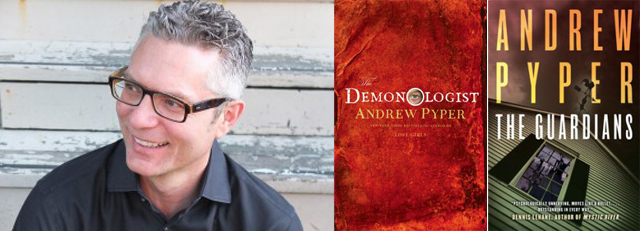
Ever wonder what authors think of book editors? We did, too! Here’s what award-winning, best-selling, Toronto-based author Andrew Pyper (The Demonologist, The Guardians, Lost Girls) has to say about being edited, as well as the difference between what makes a good editor and a great editor.
Q&A conducted by Jennifer D. Foster
Overall, what’s been your experience as an author who’s been edited?
I’ve only had good editors and great editors. I’ve had maybe one or two absentee editors, but no horror stories.
What is it like as an author to work months, or even years, on a book and to then have an editor read it critically and suggest (sometimes major) changes?
There’s always the reflex to defend the work when an editor first weighs in, but I’ve learned to wait a moment or two, because that’s all it takes to see that they’re right, or that they’ve at least put their finger on something that needs tending to. It’s rare that I end up seeing a note as just plain wrong. There’s almost always fire where there’s editorial smoke.
What do you think is the formula for a positive author/editor relationship?
Don’t see the editor as an intruder, but another voice to go along with the others already in your head. They ask those questions you might wish away but must answer in the end anyway.
What’s your advice for a writer working with an editor for the first time?
Be open. And by being open, I mean that an author should enter a relationship with an editor knowing the manuscript isn’t perfect. If an editor’s suggested fix initially strikes you as weird or against your intentions, sleep on it. There is invariably something of value to be gleaned from even the most unexpected—or unwelcome—notes.
What are the characteristics of a good editor? And a great one?
A good editor is a good reader with a toolbox of practical fixes. Good editors are like physicians in that they obey the Editorial Oath: “Above all, do no harm to the book.” They shepherd the manuscript through the stages of production, remain available to the author through questions and concerns, and cheerlead the book when it appears. But a great editor is one who is more involved on a level that matches the commitment and passion of the author. A great editor will be tough on the author, but will also defend the book against any attack. They will always be looking for ways to make a book work. The great editor will be an in-house tactician, a one-person marketing brainstorm, and an ad copy genius, as well as a sensitive line editor and a plot surgeon.
Jennifer D. Foster is a Toronto-based freelance writer and editor, specializing in fiction/non-fiction, custom publishing, magazines, and marketing and communications.

One thought on “Q&A: Author Andrew Pyper on the author/editor relationship”